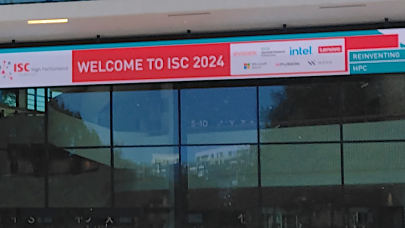April 24, 2024 – Lenovo today announced a comprehensive new suite of purpose-built AI-centric infrastructure systems and solutions to advance Hybrid AI innovation from edge to cloud. Lenovo is delivering GPU-rich and thermal efficient solutions intended for compute intensive workloads across multiple environments and industries.
 In industries such as financial services and healthcare, customers are managing massive data sets that require extreme I/O bandwidth and Lenovo is providing the IT infrastructure solutions vital to management of critical data. Across all these solutions is Lenovo TruScale, which provides the ultimate flexibility, scale and support for customers to on-ramp demanding AI workloads completely as-a-service.
In industries such as financial services and healthcare, customers are managing massive data sets that require extreme I/O bandwidth and Lenovo is providing the IT infrastructure solutions vital to management of critical data. Across all these solutions is Lenovo TruScale, which provides the ultimate flexibility, scale and support for customers to on-ramp demanding AI workloads completely as-a-service.
Regardless of where customers are in their AI journey, Lenovo Professional Services are simplifying the AI experience as customers look to meet the new demands and opportunities of AI that businesses are facing today.
“Lenovo is working to accelerate insights from data by delivering new AI solutions for use across industries delivering a significant positive impact on the everyday operations of our customers,” said Kirk Skaugen, President of Lenovo ISG. “From advancing financial service capabilities, upgrading the retail experience, or improving the efficiency of our cities, our hybrid approach enables businesses with AI-ready and AI-optimized infrastructure, taking AI from concept to reality and empowering businesses to efficiently deploy powerful, scalable and right-sized AI solutions that drive innovation, digitalization and productivity.”
Accelerating the Most Compute Demanding AI Workloads
In collaboration with AMD, Lenovo is delivering the ThinkSystem SR685a V3 8GPU server, bringing customers extreme performance for the most compute-demanding AI workloads, inclusive of GenAI and Large Language Models (LLM). The powerful solution provides fast acceleration, large memory, and I/O bandwidth to handle huge data sets, needed for advances in the financial services, healthcare, energy, climate science, and transportation industries. The new ThinkSystem SR685a V3 is the optimal solution for both enterprise private on-prem AI as well as for public AI cloud service providers.
In financial services, the ThinkSystem SR685a V3 is designed to help with fraud detection and prevention and KYC (know your customer) initiatives. The system is also ideal for applications supporting algorithmic trading strategies, risk management (real-time transaction monitoring and value-at-risk), credit issuance (loan analysis and approval recommendations), wealth management and advisory services, streamlining and augmenting regulatory compliance, and forecasting. Key features of the new system include:
- Accelerated for intense compute with leading edge 4th Generation AMD EPYC Processors and 8 new AMD Instinct MI300X GPUs.
- Fully interconnected with AMD Infinity Fabric, providing 1.5TB of high-bandwidth (HBM3) memory capacity and up to 1TB/s peak aggregate theoretical GPU I/O bandwidth performance and the speed necessary for training and deploying AI models.
- With substantial thermal headroom via air-cooling, the Lenovo SR685a V3 can sustain maximum performance of high-power CPUs and GPUs.
- Ultimate flexibility including support for NVIDIA’s latest HGX (H100/H200/B100) GPUs and drop-in support for the next generation of AMD CPU.
“Together with Lenovo, we are accelerating AI transformation for the enterprise in multiple manners – helping guide customers through this monumental shift in computing, while providing robust end-to-end solutions at scale,” said Forrest Norrod, executive vice president and general manager, Data Center Solutions Group, AMD. “We have a proven track record of bringing amazing solutions, jointly, to the market and are excited to add AMD Instinct MI300X to Lenovo’s portfolio, helping enterprises to rapidly adopt AI.”
One of the Most Powerful Edge for Azure Stack HCI Server on the Market
Lenovo is bringing AI inferencing and real time data analysis to the edge with the new Lenovo ThinkAgile MX455 V3 Edge Premier Solution with AMD EPYCTM 8004 processors. A versatile AI-optimized platform delivers new levels of AI, compute, and storage performance at the edge with the best power efficiency of any Azure Stack HCI Solution.
Offering turnkey seamless integration with on-prem and Azure cloud, Lenovo’s ThinkAgile MX455 V3 Edge Premier Solution allows customers to reduce TCO with unique lifecycle management, gain an enhanced customer experience and allows the ability to adopt software innovations faster. Lenovo’s ThinkAgile MX455 V3 Edge Premier Solution, ideal for retail, manufacturing and healthcare includes key features to:
- Reduce management overhead with automation, near zero-touch provisioning and unique Lenovo Open Cloud Automation (LOC-A) features to deploy faster and manage from anywhere in the cloud using Azure Arc enabled architecture.
- Reduce maintenance time and costs with single point of contact support and centralized, cloud-based fleet management.
- Increase security, reliability, and reduced downtime with continuous testing and automated software updates, validated by Microsoft and Lenovo.
“We hear from our customers every day that they need the power of Microsoft Azure to extend into their diverse, real-world environments – from manufacturing floors and retail spaces to fast-food outlets and other distributed locations. Our collaboration with Lenovo allows us to deliver just enough Azure to these critical edge sites while simplifying deployment and life cycle management,” said Douglas Phillips, Corporate Vice President, Azure Edge + Platform. “The ThinkAgile MX455 V3 Edge Premier Solution gives our shared customers a seamless experience from the cloud to the edge, wherever their data lives. This new solution and the power of our adaptive cloud approach enables businesses to unify teams, streamline operations, and harness the power of cloud-native and AI technologies so they can focus on transforming their business, rather than managing infrastructure.”
Solving for Compute Intensive Workloads
Lenovo and AMD are unveiling a multi-node, high-performance, thermally efficient server designed to maximize performance per rack for intensive transaction processing. The Lenovo ThinkSystem SD535 V3 is a 1S/1U half-width server node powered by a single 4th Gen AMD EPYC processor and is engineered to maximize processing power and thermal efficiency for workloads including cloud computing and virtualization at scale, big data analytic, high-performance computing and real-time e-commerce transactions for businesses of all sizes. Key features include:
- Industry-leading support of CPU technology venders in a 2U 4 node offering – allowing customers full flexibility to optimize workloads based on AMD or Intel architecture in same 2u chassis.
- Scale agility allowing configuration of 2, 3 or 4 nodes installed within one chassis.
- Simplify large scale automation, orchestration, and deployment with Lenovo XClarity system management software.
- Unified power and cooling implementation delivering up to 30% reduction in power consumption vs. Standard 1U rack server.
For more information, visit https://www.lenovo.com/us/en/servers-storage/alliance/amd.
About Lenovo
Lenovo (HKSE: 992) (ADR: LNVGY) is a US$62 billion revenue global technology powerhouse, ranked #217 in the Fortune Global 500, employing 77,000 people around the world, and serving millions of customers every day in 180 markets. Focused on a bold vision to deliver smarter technology for all, Lenovo has built on its success as the world’s largest PC company by further expanding into growth areas that fuel the advancement of ‘New IT’ technologies (client, edge, cloud, network, and intelligence) including server, storage, mobile, software, solutions, and services. This transformation together with Lenovo’s world-changing innovation is building a more inclusive, trustworthy, and smarter future for everyone, everywhere.
Source: Lenovo

























































